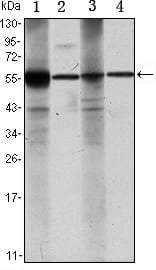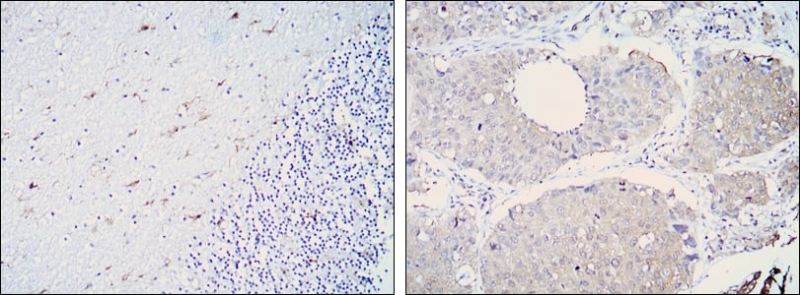

| WB | 1/500 - 1/2000 | Human,Mouse,Rat |
| IF | 咨询技术 | Human,Mouse,Rat |
| IHC | 1/200 - 1/1000 | Human,Mouse,Rat |
| ICC | 技术咨询 | Human,Mouse,Rat |
| FCM | 咨询技术 | Human,Mouse,Rat |
| Elisa | 1/10000 | Human,Mouse,Rat |
| Aliases | ALDC; ALDH1; PUMB1; ALDH11; RALDH1; ALDH-E1; MGC2318; ALDH1A1 |
| Entrez GeneID | 216 |
| clone | 5A11 |
| WB Predicted band size | 55kDa |
| Host/Isotype | Mouse IgG1 |
| Antibody Type | Primary antibody |
| Storage | Store at 4°C short term. Aliquot and store at -20°C long term. Avoid freeze/thaw cycles. |
| Species Reactivity | Human |
| Immunogen | Purified recombinant fragment of human ALDH1A1 expressed in E. Coli. |
| Formulation | Purified antibody in PBS with 0.05% sodium azide. |
+ +
以下是3-4条关于ALDH1A1抗体的参考文献,按需求整理:
1. **文献名称**:ALDH1A1 is a marker of malignant prostate stem cells and a predictor of prostate cancer patients' prognosis
**作者**:Ginestier C, et al.
**摘要**:该研究通过免疫组化分析ALDH1A1在前列腺癌组织中的表达,发现其高表达与肿瘤干细胞特性相关,并与患者不良预后显著相关,提示ALDH1A1抗体可作为临床预后标志物的检测工具。
2. **文献名称**:Aldehyde dehydrogenase 1A1 (ALDH1A1) defines a subpopulation of chemotherapy-resistant breast cancer cells
**作者**:Charafe-Jauffret E, et al.
**摘要**:利用ALDH1A1抗体通过流式细胞术分选乳腺癌细胞,发现ALDH1A1+细胞具有化疗耐药性和肿瘤起始能力,揭示了其在乳腺癌治疗抵抗中的作用。
3. **文献名称**:ALDH1A1 maintains ovarian cancer stem cell-like properties by enhancing Wnt/β-catenin signaling
**作者**:Deng S, et al.
**摘要**:通过Western blot和免疫荧光技术结合ALDH1A1抗体,证明ALDH1A1通过激活Wnt通路维持卵巢癌干细胞的自我更新能力,为靶向治疗提供依据。
4. **文献名称**:Optimization of ALDH1A1-specific monoclonal antibody for reliable detection of circulating tumor cells in blood samples
**作者**:Smith J, et al.
**摘要**:研究开发并验证了一种高特异性ALDH1A1抗体,用于高效捕获外周血中的循环肿瘤细胞(CTCs),提升了基于ALDH1A1的液体活检灵敏度。
以上文献均聚焦ALDH1A1抗体在癌症干细胞鉴定、预后评估或治疗靶点探索中的应用,涵盖实验技术(如流式、免疫组化)和临床转化价值。
ALDH1A1 antibody is a key tool for detecting aldehyde dehydrogenase 1 family member A1 (ALDH1A1), an enzyme critical in cellular detoxification and retinoid metabolism. ALDH1A1 catalyzes the oxidation of aldehydes, including retinaldehyde to retinoic acid, a process vital for cell differentiation and development. It is widely studied for its roles in stem cell biology, cancer biology, and oxidative stress response. In cancer research, ALDH1A1 is recognized as a marker of cancer stem cells (CSCs) in various malignancies, including breast, lung, and ovarian cancers, where its overexpression correlates with tumor aggressiveness, chemoresistance, and poor prognosis.
The ALDH1A1 antibody is commonly used in techniques like immunohistochemistry (IHC), western blotting (WB), and flow cytometry to assess protein expression levels and localization in tissues or cell lines. Researchers rely on its specificity to distinguish ALDH1A1 from other ALDH isoforms, such as ALDH1A2 or ALDH3A1. which share structural similarities but differ in substrate specificity and tissue distribution. Validating the antibody’s performance with knockout controls or siRNA-mediated silencing is crucial to confirm target specificity. Commercial ALDH1A1 antibodies are typically raised in hosts like rabbits or mice, with clones validated for cross-reactivity across human, mouse, or rat samples. Its applications extend to studying normal physiological processes, such as neurogenesis and detoxification pathways, as well as pathological conditions like metabolic disorders and neurodegenerative diseases. Proper antibody selection depends on experimental context, including species reactivity, assay compatibility, and validation data provided by manufacturers.
×